|
|
|
Sort Order |
|
|
|
Items / Page
|
|
|
|
|
|
|
| Srl | Item |
| 1 |
ID:
166148
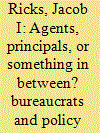

|
|
|
|
|
| Summary/Abstract |
In the aftermath of the 2006 and 2014 Thai coups, observers declared the resurrection of the bureaucratic polity. Bureaucrats, though, remained influential even during the period of 1992–2006, when elected politicians were thought to command the Thai state. Bureaucratic involvement in politics poses a challenge for dominant political science theories of politician–bureaucrat relationships, which draw heavily from principal–agent frameworks. I apply agency theory to Thailand, testing three different hypotheses derived from the theory. Examining legislative productivity and control over bureaucratic career trajectories, I find that elected politicians increasingly acted as principals of the Thai state from 1992 through 2006, and to a lesser degree from 2008 to 2013. Thai bureaucrats, though, have frequently engaged in the political sphere, blunting political oversight and expanding their independence vis-à-vis politicians. This suggests that the principal–agent model overlooks the range of resources that bureaucracies can bring to bear in developing countries, granting them greater autonomy than anticipated. As such, theories of the politician–bureaucrat relationship in developing states need to better account for the mechanisms through which bureaucrats exercise policy discretion and political influence.
|
|
|
|
|
|
|
|
|
|
|
|
|
|
|
|
| 2 |
ID:
114497
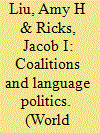

|
|
|
|
|
| Publication |
2012.
|
| Summary/Abstract |
Why is it that some governments recognize only one language while others espouse multilingualism? Related, why are some governments able to shift language policies, and if there is a shift, what explains the direction? In this article, the authors argue that these choices are the product of coalitional constraints facing the government during critical junctures in history. During times of political change in the state-building process, the effective threat of an alternate linguistic group determines the emergent language policy. If the threat is low, the government moves toward monolingual policies. As the threat increases, however, the government is forced to co-opt the alternate linguistic group by shifting the policy toward a greater degree of multilingualism. The authors test this argument by examining the language policies for government services and the education system in three Southeast Asian countries (Singapore, Malaysia, and Thailand).
|
|
|
|
|
|
|
|
|
|
|
|
|
|
|
|
| 3 |
ID:
081382
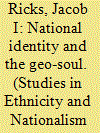

|
|
|
|
|
| Publication |
2008.
|
| Summary/Abstract |
This paper investigates the re-centring of religious identity within the geo-body in the developing world through the case study of Thailand, formerly Siam. Although by 1932, monarchic rule and colonial powers had demarcated the 'geo-body' of Siam, the national soul was not yet fully cultivated. After the fall of the absolute monarchy, Prime Minister Phibunsongkhram sought to mould the religio-national identity of Thailand until the religious community's borders coincided with those of the nation-state. One focus of nationalist leaders' efforts was the adaptation and promotion of Buddhist temples throughout the state. These temples became markers of both geographic and cosmological space, serving to infuse the geographic body with a religio-national soul. Thus, the nationalism that developed embraced the fusion of the religious identity with the national identity
|
|
|
|
|
|
|
|
|
|
|
|
|
|
|
|
| 4 |
ID:
189047
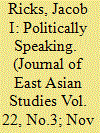

|
|
|
|
|
| Summary/Abstract |
Language is one of the quintessential markers of ethnicity. It allows co-ethnics to easily identify one another and underscores in-group and out-group boundaries. Recognizing this, politicians frequently employ ethnic tongues to enhance their political appeal. To what extent does this shape the opinions of their audiences? Utilizing a survey experiment, I test the impact of an ethnic tongue against that of the common political language among the Javanese in Indonesia, the Tagalog in the Philippines, and the Isan people in Thailand. The experiment demonstrates that the ethnic language has a significant impact in both Thailand and Indonesia, but there appears to be little effect of using Tagalog over Filipino English in the Philippines. The findings suggest that ethnic tongues have the potential to significantly enhance political appeals, both among dominant (Javanese) and marginal (Isan) ethnic groups, but when the ethnic group is already the linguistic hegemon (Tagalog), such effects may be limited.
|
|
|
|
|
|
|
|
|
|
|
|
|
|
|
|
| 5 |
ID:
162867
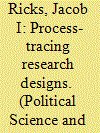

|
|
|
|
|
| Summary/Abstract |
Process-tracing has grown in popularity among qualitative researchers. However, unlike statistical models and estimators—or even other topics in qualitative methods—process-tracing is largely bereft of guidelines, especially when it comes to teaching. We address this shortcoming by providing a step-by-step checklist for developing a research design to use process-tracing as a valid and substantial tool for hypothesis testing. This practical guide should be of interest for both research application and instructional purposes. An online appendix containing multiple examples facilitates teaching of the method.
|
|
|
|
|
|
|
|
|
|
|
|
|
|
|
|
| 6 |
ID:
167463
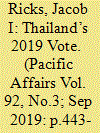

|
|
|
|
|
| Summary/Abstract |
Thailand’s March 2019 ballot was the first for the country since 2011, and for many it signaled the potential end of the military junta’s five-year rule. But was it truly a return to democracy? This essay argues that the election was far from a democratization event. Instead, it was a highly orchestrated exercise to ensure authoritarian longevity. The junta employed techniques of institutional engineering as well as managing the election’s outcomes in an effort to extend the premiership of Prayuth Chan-ocha despite increasing pressure for a return to civilian rule. The results of the election suggest that Thai society continues to exhibit deep divisions between those who support and those who oppose military interventions in politics. I further contend that the election should be seen as part of the continuing struggle by conservative forces in society to maintain their dominance in politics despite demands from other segments of the population for equal representation, a contest which is far from over.
|
|
|
|
|
|
|
|
|
|
|
|
|
|
|
|
|
|
|
|
|